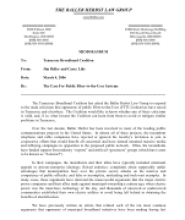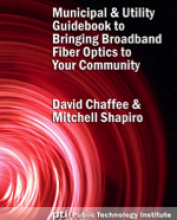
Fast, affordable Internet access for all.

“The broadband expansion fortifies the existing fiber route between BVU and Citizens as well as giving our area a redundant fiber-optic line to Northern Virginia, where bandwidth needs are increasing all the time. It is necessary to our region’s future and the survivability of our existing telecom network,” he [Virginia Delegate Terry Kilgore] noted.BVU was the first municipal network in the U.S. providing the triple-play over a full fiber-to-the-home network. And it is doing quite well according to its annual audit report.
Conducted by Brown Edwards & Co., certified public accountants, the audit revealed increased revenues and no surprises, partner and accountant Richard Linnen told the BVU board of directors at its Monday meeting. “It was a clean opinion and an unqualified audit, as it is every year,” Linnen said.Such independent audits are a useful exercise to ensure these essential networks are operating efficiently and accountably. Additionally, these audits are useful to refute false claims of impropriety from private sector companies looking to discredit publicly owned networks.

The Tennessee Broadband Coalition has asked the Baller Herbst Law Group to respond to the main criticisms that opponents of public Fiber-to-the-User (FTTU) initiatives have raised in Tennessee and elsewhere. The Coalition would like to know whether any of these criticisms is valid, and, if so, what lessons the Coalition can learn from them to avoid or mitigate similar problems in Tennessee. Over the last decade, Baller Herbst has been involved in most of the leading public communications projects in the United States. In almost all of these projects, the incumbent telephone and cable companies have rejected or ignored the locality’s invitation to join in cooperative efforts that would benefit all concerned and have instead mounted massive media and lobbying campaigns in opposition to the proposed public network. Often, the incumbents have funded support from industry “experts” and artificial “grassroots” groups (which have come to be known as “Astroturf”). In their campaigns, the incumbents and their allies have typically included emotional appeals to private-enterprise ideology; flawed statistics; complaints about supposedly unfair advantages that municipalities have over the private sector; attacks on the motives and competency of public officials; and false or incomplete, misleading and irrelevant examples. In many cases, these arguments have mirrored the unsuccessful arguments that the major electric power companies and their allies made against municipal ownership a century ago, when electric power was the must-have technology of the day, and thousands of unserved or underserved communities established their own electric utilities to avoid being left behind in obtaining the benefits of electrification.


The Municipal & Utility Guidebook to Bringing Broadband Fiber Optics to Your Community is a free, comprehensive guide to the economic and quality-of-life benefits of robust fiber infrastructure. It examines in detail four communities that have successfully deployed fiber-to-the-home (FTTH) services to their citizens and businesses. “This guidebook helps government leaders build a strong case for investing in FTTH infrastructure,“ said Alan Shark, Executive Director of PTI. “With thorough analysis, interviews and painstaking research, it sets forth strategies that, if followed, will help American communities whose broadband needs are not being met by current market dynamics to prosper in the information age.“